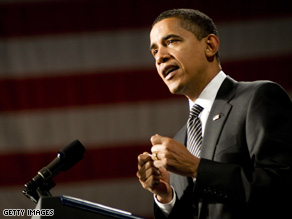WASHINGTON (CNN) -- The Obama team got off to a fast start in naming people to fill its administration.

President Obama has so far only filled 56 of the nearly 500 high-level appointees.
But then everything slowed down.
The Obama team promised to hit the ground running. And it did, naming political appointees to government positions at a record pace for the first seven weeks after the election. Then, suddenly, near the end of last year, the announcements slowed down.
"To some extent they're trying to build a plane and fly it at the same time. So there's no analog for what this administration is going through," says Michael Feldman, who was a White House official during the Clinton transition of 1992-1993.
So far, the Obama administration has announced 56 names for nearly five hundred high-level appointments that require Senate confirmation. Twenty-nine have been confirmed. That's actually a faster pace than the last two newly elected presidents.
But some key positions remain unfilled. Three Cabinet chairs are still vacant, in part because nominees withdrew their names after news of tax problems, federal investigations or ideological conflicts. The Obamaadministration is waiting to unveil a new health care initiative, but there's no Health and Human Services secretary.
Only two out of 15 Cabinet departments have a deputy secretary in place. Still vacant: deputy treasury secretary when that department is exercising enormous new power over the recovery plan; deputy education secretary when federal spending on education is growing fast.
Secretary of State Hillary Clinton went to China to discuss new policies on global warming. But only one of 14 political appointees at the Environmental Protection Agency has been confirmed.
Also vacant: FEMA director, with tornado season beginning and after a disastrous ice storm shut down much of Kentucky.
One reason why things are stalled is that the vetting process has become tougher.
"There's also the political-media industrial complex that is scrutinizing every appointee and everybody's record as they move through the process," Feldman said.
In an interview with CNN, New York University professor Paul Light, an expert on the transition process, described what he called a ``brutal'' vetting process. Potential appointees have to answer a 63-item questionnaire about their record. Even e-mails are scrutinized.
All this takes place at a time of economic crisis when federal spending and regulation are expanding.
"This administration has set a very high bar, and to their credit, they're filling these positions and they're doing so at an unprecedented level of scrutiny and at a time when things are moving much more quickly," says Feldman.
Who's doing these jobs in the meantime? Career civil servants. The White House has to make sure all that recovery money gets spent, quickly, to boost the economy. That's a political imperative. The White House needs people on the Obama team to carry it out.
CNN Senior Political Analyst

No comments :
Post a Comment